#Ralph Abernathy
Text
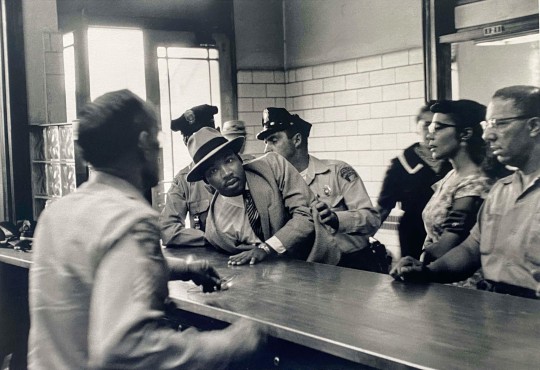
Martin Luther King Jr. is arrested for "loafing around in court" as his wife, Coretta, looks on. King was at the courthouse in Montgomery Alabama to support his friend and mentor, civil-rights leader Ralph David Abernathy. (Photo by Charles Moore, September 3, 1958.)
#icons#black excellence#history#1950s#mlk#blm#black tumblr#chaos#b&w#civil rights#retro#community#martin luther king jr#ralph abernathy#coretta scott king#black history#photos#politics#culture#people#📚
460 notes
·
View notes
Photo


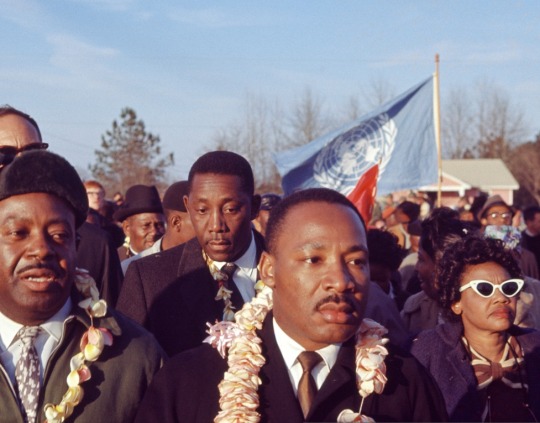


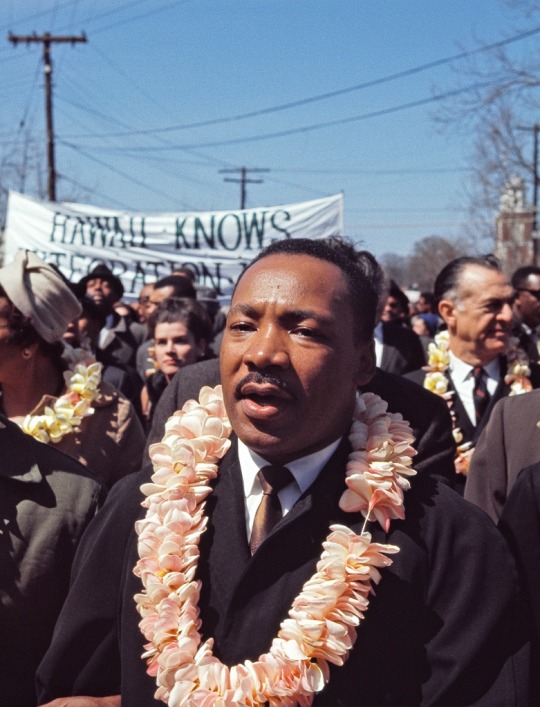
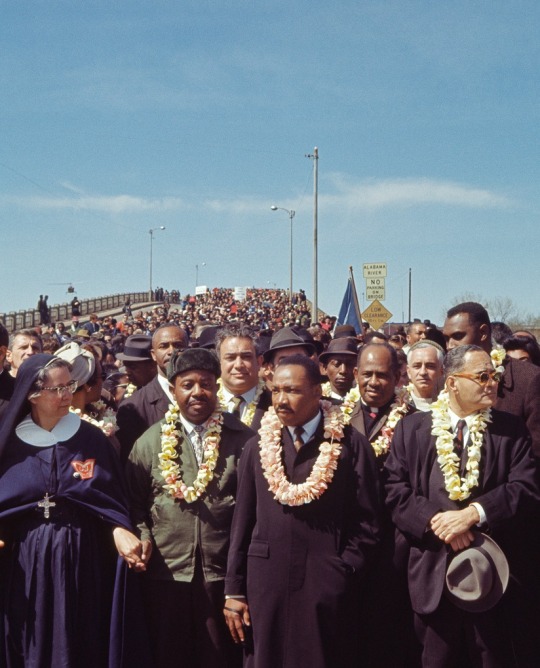
Dr. Martin Luther King, Jr. leading the Selma to Montgomery Civil Rights marches in Alabama, March 1965.
Photos by Bob Adelman
393 notes
·
View notes
Text


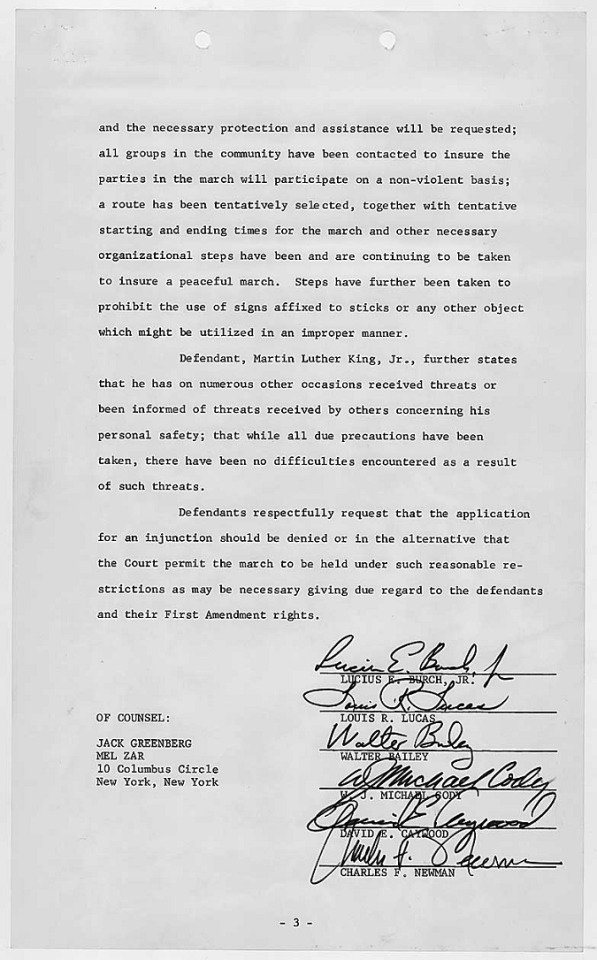
Response of Martin Luther King, Jr., to allegations by the city of Memphis, TN, that he and others were engaged in a conspiracy to incite riots or breaches of the peace, April 4, 1968.
“The defendants are not presently and have never been engaged in any conspiracies as alleged in the complaint.”
Record Group 21: Records of District Courts of the United States
Series: Civil Cases
File Unit: City of Memphis vs Martin Luther King, Jr., et. al., Civil C-68-80
Transcription:
IN THE UNITED STATES DISTRICT COURT FOR THE WESTERN DISTRICT OF TENNESSEE WESTERN DIVISION
CITY OF MEMPHIS,
A Municipal Corporation,
Complainant
VS
MARTIN LUTHER KING, JR., NO. C-68-80
HOSEA WILLIAMS, REVEREND
JAMES BEVEL, REVEREND JAMES
ORANGE, RALPH D. ABERNATHY and
BERNARD LEE, all non-residents
of the State of Tennessee
Defendants
ANSWER
The defendants deny each and every allegation of the complainant except as follows:
The defendant Martin Luther King, Jr. and members of his staff were invited by local ministers to participate in a march held on March 28, 1967. Said march was held under the supervision of local ministers and the responsibility for planning and supervision to maintain order did not rest with these defendants.
The defendant King at the urgent request of local
[page 2]
march leaders did leave the scene of disorder. At the same time, local leaders made immediate and successful efforts to turn the march back.
The defendants have organized and conducted in many communities utilizing the principals of non-violence numerous marches, none of which have resulted in civil disturbance. The defendants are not presently and have never been engaged in any conspiracies as alleged in the complaint. Defendants have in no way in their private or public statements sponsored, fermented, encouraged and incited riots, mobs or breaches of the peace as alleged in the complaint.
Defendants further state that they have never refused to furnish information concerning marches or plans as such information became available; that in fact said information has been furnished on a continuing basis to local law enforcement officers; that there is no statute or ordinance requiring the issuance of a parade or march permit by police authorities. However, to the extent that there is any custom or practice of submitting plans for parades or marches to police officials for discussion and review, the defendants have and will continue to do so as soon as practical after said plans have been made.
The defendants utilizing their experience have undertaken the following general steps to insure that the march will be non-violent and under control at all times. Limitations will be placed on the number of marchers in each line; parade marshals will be carefully selected and given training in their duties; liaison will be maintained with local law enforcement officers
[page 3]
and the necessary protection and assistance will be requested; all groups in the community have been contacted to insure the parties in the march will participate on a non-violent basis; a route has been tentatively selected, together with tentative starting and ending times for the march and other necessary organizational steps have been and are continuing to be taken to insure a peaceful march. Steps have further been taken to prohibit the use of signs affixed to sticks or any other object which might be utilized in an improper manner.
Defendant, Martin Luther King, Jr., further states that he has on numerous other occasions received threats or been informed of threats received by others concerning his personal safety; that while all due precautions have been taken, there have been no difficulties encountered as a result of such threats.
Defendants respectfully request that the application for injunction should be denied or in the alternative that the Court permit the march to be held under such reasonable restrictions as may be necessary giving due regard to the defendants and their First Amendment rights.
OF COUNSEL:
JACK GREENBERG
MEL ZAR
10 Columbus Circle
New York, New York
LUCIUS E. BURCH, JR.
LOUIS R. LUCAS
WALTER BAILEY
W. J. MICHAEL CODY
DAVID E. CAYWOOD
CHARLES F. NEWMAN
#archivesgov#April 4#1968#1960s#civil rights#Black history#African American history#MLK#Martin Luther King Jr#Hosea Williams#James Bevel#James Orange#Ralph Abernathy#Bernard Lee
73 notes
·
View notes
Text

5 notes
·
View notes
Video
youtube
History to Page and Screen: The Watsons Go To Birmingham 1963
Talking about The Watsons go to Birmingham - 1963 book, its 2013 movie adaptation, and the history behind the story.
I had to reedit this video so many times and I finally got it past the copyright claims (for now)! Hope you enjoy.
Twitter - @BlackPeriodFilm Instagram - @blackinperiodfilms Subscribe to the Black in Period Films Youtube >>>> HERE
#The Watsons Go To Birmingham 1963#The Watsons Go To Birmingham#video#Civil Rights Movement#Christopher Paul Curtis#dr. martin luther king jr.#Ralph Abernathy#Fred Shuttlesworth#Bryce Clyde Jenkins#Harrison Knight#Skai Jackson#Anika Noni Rose#Wood Harris#book to movie#youtube videos
10 notes
·
View notes
Text
Se puede matar al soñador, pero no al sueño.
Ralph David Abernathy
4 notes
·
View notes
Text
I went to jail 44 times. I’ve been beaten and left for dead on the side of the road fighting for freedom… Yet Rosa Parks is better known in history than Ralph David Abernathy. Why is that?
– Ralph Abernathy
2 notes
·
View notes
Text
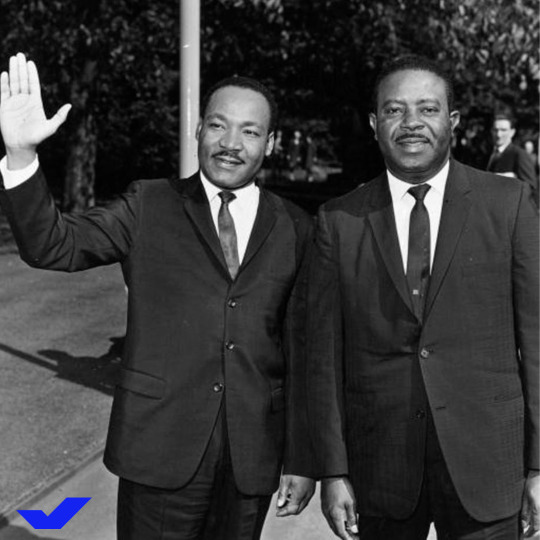
On This Day in 1926: Ralph D. Abernathy, Baptist minister and civil rights leader, was born.
As a partner and friend to Rev. Dr. Martin Luther King Jr., Abernathy helped organize the historic Montgomery Bus Boycotts and co-founded the Southern Christian Leadership Conference.
7 notes
·
View notes
Text
What You Need To Know About The Origins Of Black History Month
Black History Month is Considered one of the Nation’s Oldest Organized History Celebrations, and has been Recognized by U.S. Presidents for Decades Through Proclamations and Celebrations. Here is Some Information about the History of Black History Month.
— By Jesse J. Holland | February 1, 2024 | Associated Press
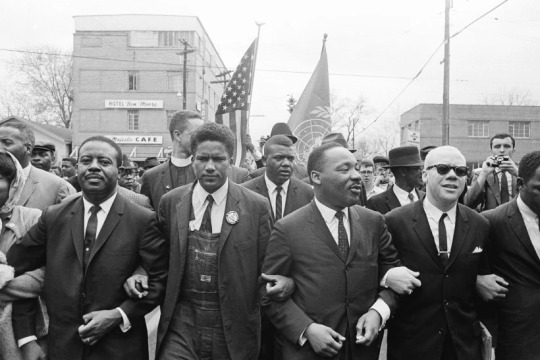
Dr. Martin Luther King, Jr. locks arms with his aides as he leads a march of several thousands to the court house in Montgomery, Alabama, March 17, 1965. From left: Rev. Ralph Abernathy, James Foreman, King, Jesse Douglas, Sr., and John Lewis (partially out of frame). (AP Photo)
How Did Black History Month Start?
It was Carter G. Woodson, a founder of the Association for the Study of African American History, who first came up with the idea of the celebration that became Black History Month. Woodson, the son of recently freed Virginia slaves, who went on to earn a Ph.D in history from Harvard, originally came up with the idea of Negro History Week to encourage Black Americans to become more interested in their own history and heritage. Woodson worried that Black children were not being taught about their ancestors’ achievements in American schools in the early 1900s.
“If a race has no history, if it has no worthwhile tradition, it becomes a negligible factor in the thought of the world, and it stands in danger of being exterminated,” Woodson said.

Carter G. Woodson in an undated photograph. Woodson is a founder of the Association for the Study of African American History, who first came up with the idea of the celebration that became Black History Month. Woodson, the son of recently-freed Virginia slaves who went on to earn a Ph.D in history from Harvard, originally came up with the idea as Negro History Week to encourage black Americans to become more interested in their own history. (AP Photo)
Why is Black History Month in February?
Woodson chose February for Negro History Week because it had the birthdays of President Abraham Lincoln and Frederick Douglass. Lincoln was born on Feb. 12, and Douglass, a former slave who did not know his exact birthday, celebrated his on Feb. 14.
Daryl Michael Scott, a Howard University history professor and former ASAAH president, said Woodson chose that week because Black Americans were already celebrating Lincoln’s and Douglass’s birthdays. With the help of Black newspapers, he promoted that week as a time to focus on African-American history as part of the celebrations that were already ongoing.
The first Negro History Week was announced in February 1926.
“This was a community effort spearheaded by Woodson that built on tradition, and built on Black institutional life and structures to create a new celebration that was a week long, and it took off like a rocket,” Scott said.
Why The Change From a Week To a Month?
Negro History Week was wildly successful, but Woodson felt it needed more.
Woodson’s original idea for Negro History Week was for it to be a time for student showcases of the African-American history they learned the rest of the year, not as the only week Black history would be discussed, Scott said. Woodson later advocated starting a Negro History Year, saying that during a school year “a subject that receives attention one week out of 36 will not mean much to anyone.”
Individually several places, including West Virginia in the 1940s and Chicago in the 1960s, expanded the celebration into Negro History Month. The civil rights and Black Power movement advocated for an official shift from Black History Week to Black History Month, Scott said, and, in 1976, on the 50th anniversary of the beginning of Negro History Week, the Association for the Study of African American History made the shift to Black History Month.

Six Catholic nuns, including Sister Mary Antona Ebo, front row fourth from left, lead a march in Selma, Ala., on March 10, 1965, in support of Black voting rights and in protest of the violence of Bloody Sunday when white state troopers brutally dispersed peaceful Black demonstrators. (AP Photo, File)
Presidential Recognition
Every president since Gerald R. Ford through Joe Biden has issued a statement honoring the spirit of Black History Month.
Ford first honored Black History Week in 1975, calling the recognition “most appropriate,” as the country developed “a healthy awareness on the part of all of us of achievements that have too long been obscured and unsung.” The next year, in 1976, Ford issued the first Black History Month commemoration, saying with the celebration “we can seize the opportunity to honor the too-often neglected accomplishments of Black Americans in every area of endeavor throughout our history.”
President Jimmy Carter added in 1978 that the celebration “provides for all Americans a chance to rejoice and express pride in a heritage that adds so much to our way of life.” President Ronald Reagan said in 1981 that “understanding the history of Black Americans is a key to understanding the strength of our nation.”
— This Article by Former AP Reporter Jesse J. Holland was Originally Published on Feb. 2, 2017.
#Black History Month#Origins#Nation’s Oldest Organized History Celebrations#Dr. Martin Luther King#Montgomery | Alabama#Rev. Ralph Abernathy | James Foreman | Jesse Douglas Sr. | John Lewis#Negro History#Presidential Recognition
2 notes
·
View notes
Photo

Resident Evil - Albert Wesker and Alice Abernathy (Natasha Loginova)
#resident evil#biohazard#game#horror game#horror#scientists#albert wesker#アルバート・ウェスカー#alice resident evil#resident evil alice#alice biohazard#biohazard alice#alice abernathy#janus prospero#natasha loginova#ナターシャ・ロギノワ#アリス・アバーナシー#milla jovovich alice#milla jovovich#ralph fiennes#ultimate anna
2 notes
·
View notes
Photo
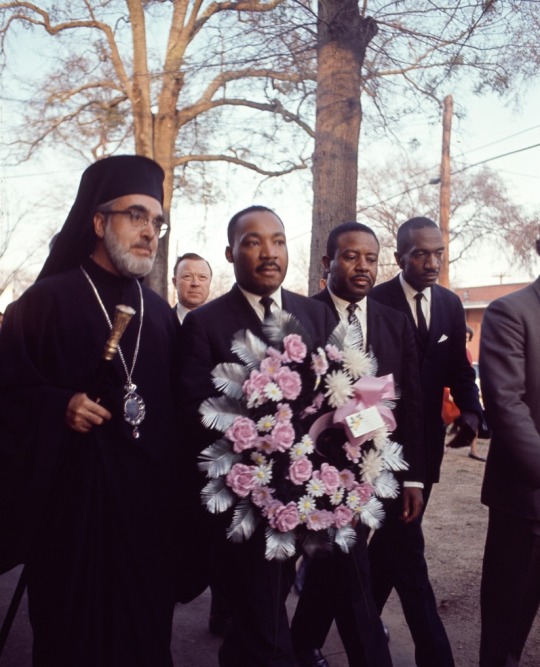
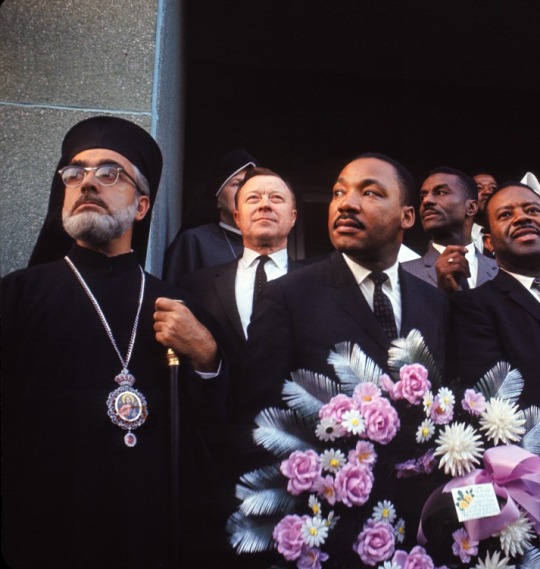

Archbishop Iakovos, Dr. Martin Luther King Jr. and Rev. Ralph Abernathy leading a memorial march for Rev. James Reeb to the Dallas County Courthouse in Selma on March 15, 1965.
Photo by Bob Adelman
#archbishop iakovos#martin luther king jr#ml kwamis choice#ralph abernathy#civil rights#salem#history#1965#1960s#dr king
189 notes
·
View notes
Text
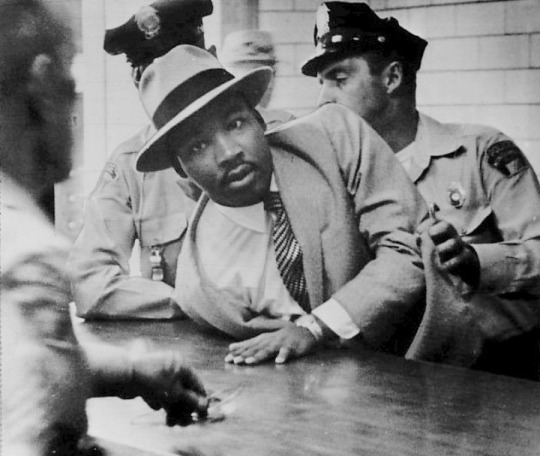
Martin Luther King Jr. was Arrested 29 times for these so-called crimes. Here are just a few occasions when he was arrested and why:
January 26, 1956 — He was arrested in Montgomery, Alabama as part of a "Get Tough" campaign to intimidate the bus boycotters. Four days later, on January 30, his home was bombed.
March 22, 1956 — King, Rosa Parks and more than 100 others were arrested on charges of organizing the Montgomery Bus Boycott in protest of Parks' treatment.
September 3, 1958 — While attempting to attend the arraignment of a man accused of assaulting Abernathy, King is arrested outside Montgomery's Recorder's Court and charged with loitering. He is released a short time later on $100 bond.
September 5, 1958 — King was convicted of disobeying a police order and fined $14. He chooses to spend 14 days in jail, but is soon released when Police Commissioner Clyde Sellers pays his fine.
October 19, 1960 — He was arrested in Atlanta, Georgia during a sit-in while waiting to be served at a restaurant. He was sentenced to four months in jail, but after intervention by then presidential candidate John Kennedy and his brother Robert Kennedy, he was released.
May 4, 1961 — He was arrested in Albany, Georgia for obstructing the sidewalk and parading without a permit.
April 12, 1963 — He and Ralph Abernathy were arrested in Birmingham, Alabama for demonstrating without a permit.
During his time in jail, he he wrote what is now known as his historic "Letter from Birmingham Jail."
June 11, 1964 — He was arrested for protesting for the integration of public accommodations in St. Augustine, Florida.
February 2, 1965 — He was arrested in Selma, Alabama during a voting rights demonstration, but the demonstrations continued leading to demonstrators being beaten at the Pettus Bridge by state highway patrolmen and sheriff's deputies.
Legendary civil rights activist Dr. Martin Luther King Jr. spent a night in the jail on a trespassing charge after he and others were arrested after they attempted to eat in the Monson Restaurant on June 11, 1964. The arrest was reported in The St. Augustine Record and is included in the state legislative committee's investigative report, "Racial & Civil Disorders in St. Augustine," February 1965.
•••
Martin Luther King Jr. fue arrestado 29 veces por estos supuestos “crímenes”. Estas son sólo algunas ocasiones en las que fue arrestado y el por qué:
26 de enero de 1956: Fue arrestado en Montgomery, Alabama, como parte de una campaña "Get Tough (Ponerse Firme)" para intimidar a los boicoteadores de autobuses. Cuatro días después, el 30 de enero, su casa fue bombardeada.
22 de marzo de 1956: King, Rosa Parks y más de 100 personas más fueron arrestados acusados de organizar el boicot a los autobuses de Montgomery. Esto en protesta por el trato que recibió Parks.
3 de septiembre de 1958: Mientras intentaba asistir a la lectura de cargos de un hombre acusado de agredir a Abernathy, King es arrestado frente al Tribunal de Registro de Montgomery y acusado de holgazanería. Poco tiempo después fue liberado, luego de pagar una fianza de 100 dólares.
5 de septiembre de 1958: King fue declarado culpable de desobedecer una orden policial y multado con 14 dólares. Eligió pasar 14 días en la cárcel, pero pronto lo liberan luego de que el comisionado de policía Clyde Sellers pagara la multa.
19 de octubre de 1960: Fue arrestado en Atlanta, Georgia, durante una sentada mientras esperaba que lo atendieran en un restaurante. Fue sentenciado a cuatro meses de cárcel, pero tras la intervención del entonces candidato presidencial John Kennedy y su hermano Robert Kennedy, fue puesto en libertad.
4 de mayo de 1961: Fue arrestado en Albany, Georgia, por obstruir la acera y desfilar sin permiso.
12 de abril de 1963: Él y Ralph Abernathy fueron arrestados en Birmingham, Alabama, por realizar una protesta sin permiso.
Durante su estancia en la cárcel, escribió lo que ahora se conoce como su histórica "Carta desde la cárcel de Birmingham".
11 de junio de 1964: Fue arrestado por protestar por la integración de alojamientos públicos en St. Augustine, Florida.
2 de febrero de 1965: Fue arrestado en Selma, Alabama, durante una protesta por el derecho al voto, pero las protestas continuaron y los protestantes fueron golpeados en el puente Pettus por patrulleros de carreteras estatales y agentes del sheriff.
El legendario activista de derechos civiles, Dr. Martin Luther King Jr., pasó una noche en la cárcel acusado de invasión de propiedad privada después de que él y otros fueran arrestados después de intentar comer en el restaurante Monson el 11 de junio de 1964. El arresto fue informado en el periódico The St. Augustine Record y está incluido en el informe de investigación del comité legislativo estatal, "Desórdenes Civiles y Raciales en St. Augustine", febrero de 1965.
#martin luther king jr#martin luther king day#blacklivesmatter#blacklivesalwaysmatter#blackhistory#history#blackhistorymonth#blackpeoplematter#blackhistoryeveryday#blackhistory365#blackhistoryfacts#black history is everybody's history#black history is world history#black history is american history#historyfacts#black history matters#black history month#black history#knowyourhistory#no justice no peace#historical#justice#share#justice system#english#spanish#read#civil rights#civil rights movement#martin luther king quotes
121 notes
·
View notes
Text
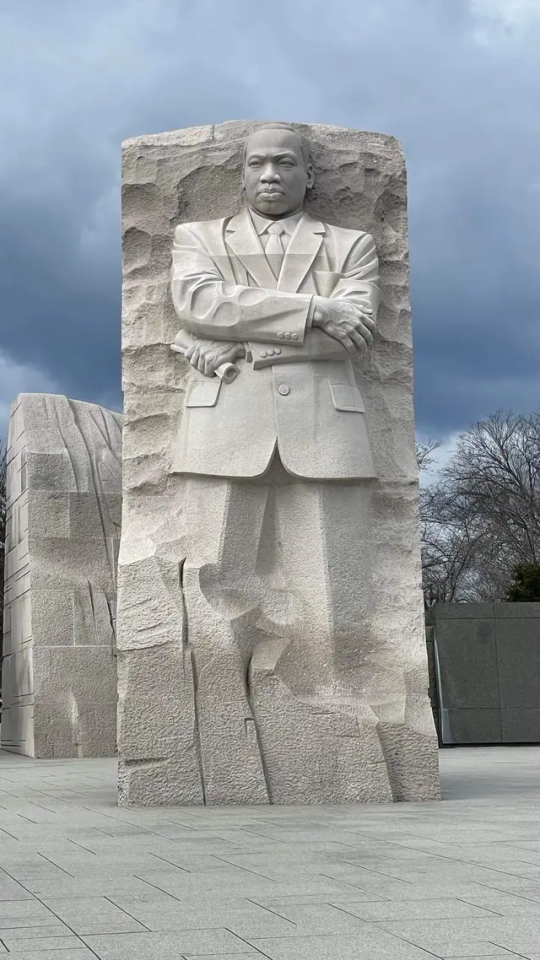
LETTERS FROM AN AMERICAN
January 14, 2024
HEATHER COX RICHARDSON
You hear sometimes, now that we know the sordid details of the lives of some of our leading figures, that America has no heroes left.
When I was writing a book about the Wounded Knee Massacre, where heroism was pretty thin on the ground, I gave that a lot of thought. And I came to believe that heroism is neither being perfect, nor doing something spectacular. In fact, it’s just the opposite: it’s regular, flawed human beings choosing to put others before themselves, even at great cost, even if no one will ever know, even as they realize the walls might be closing in around them.
It means sitting down the night before D-Day and writing a letter praising the troops and taking all the blame for the next day’s failure upon yourself, in case things went wrong, as General Dwight D. Eisenhower did.
It means writing in your diary that you “still believe that people are really good at heart,” even while you are hiding in an attic from the men who are soon going to kill you, as Anne Frank did.
It means signing your name to the bottom of the Declaration of Independence in bold print, even though you know you are signing your own death warrant should the British capture you, as John Hancock did.
It means defending your people’s right to practice a religion you don’t share, even though you know you are becoming a dangerously visible target, as Sitting Bull did.
Sometimes it just means sitting down, even when you are told to stand up, as Rosa Parks did.
None of those people woke up one morning and said to themselves that they were about to do something heroic. It’s just that, when they had to, they did what was right.
On April 3, 1968, the night before the Reverend Doctor Martin Luther King Jr. was assassinated by a white supremacist, he gave a speech in support of sanitation workers in Memphis, Tennessee. Since 1966, King had tried to broaden the Civil Rights Movement for racial equality into a larger movement for economic justice. He joined the sanitation workers in Memphis, who were on strike after years of bad pay and such dangerous conditions that two men had been crushed to death in garbage compactors.
After his friend Ralph Abernathy introduced him to the crowd, King had something to say about heroes: “As I listened to Ralph Abernathy and his eloquent and generous introduction and then thought about myself, I wondered who he was talking about.”
Dr. King told the audience that, if God had let him choose any era in which to live, he would have chosen the one in which he had landed. “Now, that’s a strange statement to make,” King went on, “because the world is all messed up. The nation is sick. Trouble is in the land; confusion all around…. But I know, somehow, that only when it is dark enough, can you see the stars.” Dr. King said that he felt blessed to live in an era when people had finally woken up and were working together for freedom and economic justice.
He knew he was in danger as he worked for a racially and economically just America. “I don’t know what will happen now. We’ve got some difficult days ahead. But it doesn't matter…because I’ve been to the mountaintop…. Like anybody, I would like to live a long life…. But I’m not concerned about that now. I just want to do God’s will. And He’s allowed me to go up to the mountain. And I’ve looked over. And I’ve seen the promised land. I may not get there with you. But I want you to know tonight, that we, as a people, will get to the promised land!”
People are wrong to say that we have no heroes left.
Just as they have always been, they are all around us, choosing to do the right thing, no matter what.
Wishing you all a day of peace for Martin Luther King Jr. Day 2024.
[Image of the Martin Luther King Jr. Memorial in Washington, D.C., by Buddy Poland.]
LETTERS FROM AN AMERICAN
HEATHER COX RICHARDSON
#Heather Cox Richardson#Letters From An American#Martin Luther King Jr.#MLK Jr.#heros#memorial#justice
28 notes
·
View notes
Text
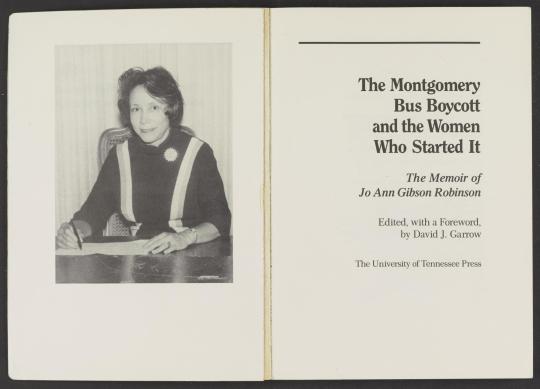
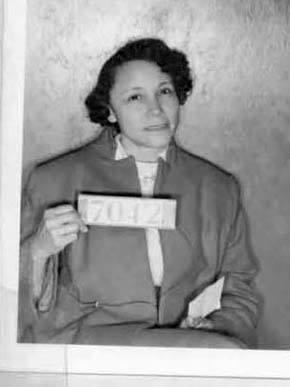
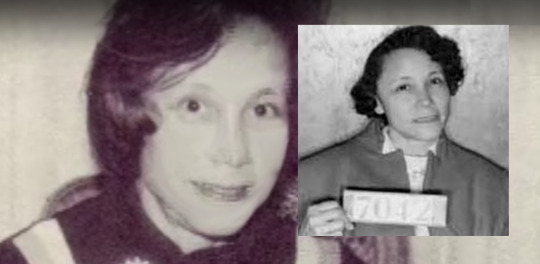
Jo Ann Gibson Robinson ,unsung activist (April 17, 1912 – August 29, 1992) was a civil rights activist and educator in Montgomery, Alabama.Known for initiating the 1955 bus boycott in Montgomery, AL, USA
Born near Culloden, Georgia, she was the youngest of twelve children. She attended Fort Valley State College and then became a public school teacher in Macon, where she was married to Wilbur Robinson for a short time. Five years later, she went to Atlanta, where she earned an M.A. in English at Atlanta University. After teaching in Texas she then accepted a position at Alabama State College in Montgomery. It was there she joined the Women's Political Council, which Mary Fair Burks had founded three years earlier. In 1949, Robinson was verbally attacked by a bus driver for sitting in the front "Whites only" section of the bus. Her response to the incident was to attempt to start a protest boycott. But, when she approached her fellow members of the Woman’s Political Council with her story and proposal, she was told that it was “a fact of life in Montgomery.” In late 1950, she succeeded Burks as president of the WPC and helped focus the group's efforts on bus abuses. Robinson was an outspoken critic of the treatment of African-Americans on public transportation. She was also active in the Dexter Avenue Baptist Church.
The Women's Political Council had made complaints about the bus seating to the Montgomery City Commission and about abusive drivers, and achieved some concessions, including an undertaking that drivers would be courteous and having buses stopping at every corner in black neighborhoods, as they did in European areas. After Brown vs. Board of Education, Robinson had informed the mayor of the city that a boycott would come and then after Rosa Parks arrest, they seized the moment to plan the boycott of the buses in Montgomery.
On Thursday, December 1, 1955, Rosa Parks was arrested for refusing to move from her seat in the African area of the bus she was travelling on to make way for a white passenger who was standing. Mrs. Parks, a civil rights organizer, had intended to instigate a reaction from white citizens and authorities. That night, with Mrs. Parks permission, Mrs. Robinson stayed up mimeographing 52,500 handbills calling for a boycott of the Montgomery bus system. The boycott was initially planned to be for just the following Monday. She passed out the leaflets at a Friday afternoon meeting of AME Zionist clergy among other places and Reverend L. Roy Bennett requested other ministers attend a meeting that Friday night and to urge their congregations to take part in the boycott. Robinson, Reverend Ralph David Abernathy, two of her senior students and other Women's Council members then passed out the handbills to high school students leaving school that afternoon. After the success of the one-day boycott, African citizens decided to continue the boycott and established the Montgomery Improvement Association to focus their efforts. The Reverend Martin Luther King, Jr. was elected president. Jo Ann Robinson became a member of this group. She had denied an official position to the Montgomery Improvement Association because of her teaching position at Alabama State. She served on its executive board and edited their newsletter. In order to protect her position at Alabama State College and to protect her colleagues, Robinson purposely stayed out of the limelight even though she worked diligently with the MIA. Robinson and other WPC members also helped sustain the boycott by providing transportation for boy-cotters.
Robinson was the target of several acts of intimidation. In February 1956, a local police officer threw a stone through the window of her house. Then two weeks later, another police officer poured acid on her car. Then the governor of Alabama ordered the state police to guard the houses of the boycott leaders. The boycott lasted over a year because the bus company would not give in to the demands of the protesters. After a student sit-in in early 1960, Robinson and other teachers that had supported the students, resigned their positions at Alabama State College. Robinson left Alabama State College and moved out of Montgomery that year. She taught at Grambling College in Louisiana for one year and then moved to Los Angeles and taught English in the public school system. In Los Angeles she continued to be active in local women's organizations. She taught in the LA schools until she retired from teaching in 1976. Jo Ann Robinson was also a part of the bus boycott and was strongly against discrimination.
#african#kemetic dreams#afrakan#africans#afrakans#brown skin#brownskin#Jo Ann Robinson#alabama state college#macon#fort valley college
25 notes
·
View notes
Text
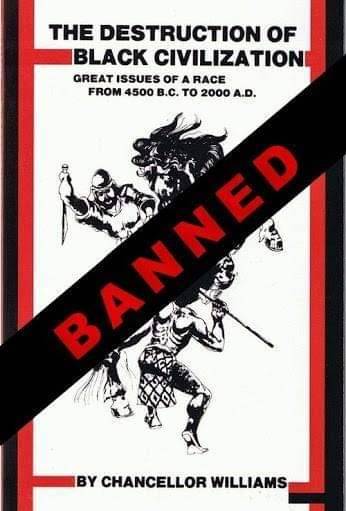
The Destruction of Black Civilization and The Origin of African Civilization by Chancellor Williams were challenged at the Prince George County high school libraries in 1993 because the two volumes were said to promote “racism against white people.” In a complaint filed with the state, the works were called “racist pornography” written “to provoke emotions and actions of racial prejudice, bias, hatred, and hostility towards citizens and students in Maryland.”
A widely read history of Africans well researched analysis details the development of civilization in Africa. Now ask yourself, what information is contained in this they really did not want you to know? And do you know it?
Challenged and Banned Books by and about African Americans
Young and Black In America by Rae Pace Alexander
1983—After the Minnesota Civil Liberties Union sued the Elk River School Board, the Board reversed its decision to restrict the title to students who have written permission from their parents. (MN)
And the Walls Came Tumbling Down by Ralph D. Abernathy
1989—Burned protest in Denver because it alleges that Martin Luther King, Jr. was involved with three women. E. Napoleon Walton, the publisher of the Denver Cosmopolitan Advertiser, stated, “[Abernathy] has his freedom of speech, and we have our freedom to burn it.” (CO)
And Still I Rise by Maya Angelou
1982—Challenged at the Northside High School in Lafayette, Louisiana. (LA)
1987—Challenged at the Longview school system in Washington because some “students could be harmed by its graphic language.” (WA)
I Know Why the Caged Bird Sings by Maya Angelou
1983 – 2009—Over thirty-five challenges in twenty states since the book’s publication.
2009—Challenged in the Newman-Crows Landing School District on a required reading list presented by the Orestimba High English Department. A trustee questioned the qualifications of Orestimba staff to teach a novel depicting African American culture. (CA)
Another Country by James Baldwin
1963—Considered obscene, the book was banned from the New Orleans Public library. After a year of litigation, it was restored. (LA)
Blues for Mister Charlie by James Baldwin
1980—Challenged in Sioux Falls, South Dakota because it’s “pornographic,” and it “tears down Christian principles.” (SD).
Go Tell It on the Mountain by James Baldwin
1994—Challenged as required reading in the Hudson Falls Schools because the books has recurring themes of rape, masturbation, violence, and degrading treatment of women. (NY)
1998—Challenged as a ninth-grade summer reading option in Prince William County because the book “was rife with profanity and explicit sex.” (VA)
If Beale Street Could Talk by James Baldwin
1989—Removed from the St. Paul High School Library because the book contains obscene language and explicit descriptions of sexual activity. (OR)
Tell Me How Long the Train’s Been Gone by James Baldwin
1983—Four members of the Alabama State Textbook Committee called for its rejection because Baldwin’s work preaches “bitterness and hatred against whites.” (AL)
The Toilet by Amiri Baraka
1969—Expurgated at Eastern High School to eliminate “four-letter words or vernacular.”
Manchild in the Promised Land by Claude Brown
1974 – 1987—Challenged five times in four states. (WI, FL, LA, OH, OR)
1987—Challenged at the Parkrose High School because the content is “violent, the language offensive, and women are degraded.” The protestors also questioned its relevance, claiming that Parkrose students have no need to understand life in a black ghetto. (OR)
A Hero Ain’t Nothin But a Sandwich by Alice Childress
1976 – 1994—Challenged five times in five states. (NY, GA, TX, MD, SC)
1976—Removed from Island Trees School Union Free District High School library along with nine other titles because they were considered “immoral, anti-American, anti-Christian, or just plain filthy.” (NY)
Rainbow Jordan by Alice Childress
1986—Challenged at the Gwinnett County public schools because of “foul language and sexual references.” (GA)
1986—Banned from Spokane middle schools because the book’s storyline about a prostitute’s daughter was “too mature.” (WA)
Soul on Ice by Eldridge Cleaver
1969 -1979—Challenged five times in four states. (CA, CT, NY, WA)
1975—Challenged at the Greenwich High School library because the book is “crime provoking and anti-American as well as obscene and pornographic.” (CT)
Invisible Man by Ralph Ellison
1994—Retained in the Yakima schools after a five-month dispute over what advanced high school students should read in the classroom. Two parents raised concerns about profanity and images of violence and sexuality in the book and requested that it be removed from the reading list. (WA)
2013—North Carolina school board considers banning the book after the mother of an 11-grader complained, claiming Ellison’s work was inappropriate for 11th grade summer reading, citing both language and subject matter.
The Autobiography of Miss Jane Pittman by Ernest J. Gaines
2006—Challenged as an eighth-grade district-wide reading assignment in the Puyallup schools because “racial slurs and stereotyping are used throughout the book, as well as scenes of sex, rape, and implied incest.”
A Lesson Before Dying by Ernest J. Gaines
2004—Removed from the college bookstore at Louisiana College, Pineville by the college president “because a love scene described in the book clashes with the school’s Christian values.” (LA)
My House by Nikki Giovanni
1992—Challenged by the Duval County public school libraries because it contains the word “nigger” and was accused of containing excessive vulgarity, racism, and sex. (FL)
A Raisin in the Sun by Lorraine Hansberry
1979—Responding to criticism from an anti-pornography organization, the Ogden School District restricted circulation of Hansberry’s play. (UT)
Nappy Hair by Carolivia Herron
1998—Challenged in Brooklyn because it was considered racially insensitive. (NY)
The Best Short Stories By Negro Writers an Anthology From 1899 to the Presentedited by Langston Hughes
1976—Removed from Island Trees School Union Free District High School library along with nine other titles because they were considered “immoral, anti-American, anti-Christian, or just plain filthy.” (NY)
Their Eyes Were Watching God by Zora Neale Hurston
1997—Challenged for sexual explicitness, but retained on the Stonewall Jackson High School’s academically advanced reading list in Brentsville. A parent objected to the novel’s language and sexual explicitness.
Call Me Charley by Jesse Jackson
1979—Parents of a black fourth-grade student filed suit against Grand Blanc school officials after a teacher read this title to their son’s class. The work includes a black youth “Sambo,” “nigger,” and “coon.”
The Autobiography of Malcolm X by Malcom X with Alex Haley
1993—Challenged in the Duval County Public School district because the slain Black Muslim leader advocated anti-white racism and violence. (FL)
Mirandy and Brother Wind by Patricia McKissack
1991—Challenged at the Glen Springs Elementary School in Gainesville, Florida, because of the book’s use of black dialect. (FL)
Daddy Was a Number Runner by Louise Meriweather
1977—Removed from all Oakland junior high school libraries and its use restricted in senior high schools, following a complaint about the book’s explicit depiction of ghetto life. (CA)
Beloved by Toni Morrison
1995 – 2007—Challenged seven times in six states since its publication. (FL, TX, ME, IL, ID, & KY)
2007—Challenged in the Coeur d’Alene School District. Some parents say the book along with five others should require parental permission for students to read them. (ID)
2013—Parent wants the book removed because she believes it depicts scenes of bestiality, gang rape and an infant’s gruesome murder, content she believes could be too intense for teenage readers.
The Bluest Eye by Toni Morrison
1994 – 2007—Challenged eleven times in nine states since publication. (AK, PA, FL, MA, MD, NH, CA, CO, MI)
2005—Banned from the Littleton curriculum and library shelves after complaints about its explicit sex, including the rape of an eleven-year-old girl by her father. (CO)
2013– The board of education president in Ohio is criticizing the inclusion of the book on the Common Core Standard’s recommended reading list for 11th-graders, labeling the controversial work “pornographic,” and wishes to ban it from the classroom.
Song of Solomon by Toni Morrison
1993 – 2009—Challenged in five states due to its sexually explicitly language. (OH, GA, FL, MD, MI)
1998—Removed from the St. Mary’s County Schools’ approved text list by the school superintendent overruling a faculty committee recommendation. Complaints referred to the novel as “filth,” “trash,” and “repulsive.” (MD)
Sula by Toni Morrison
2000—Challenged on the Poolesville High School reading list because of the book’s sexual content and language. On October 5, 2000, Montgomery County Circuit Court Judge Paul McGuckian dismissed the bid to band the work from the curriculum. The school, however, decided to remove the book from the summer reading list. (MD)
Learning Tree by Gordon Parks
1976 – 2006—Challenged seven times in seven states since publication. (WY, MD, RI, WA, FL, MN, AL)
2006—Challenged on the summer reading list at LeFlore High School in Mobile becdause the author frequently used inappropriate words, such as “nigga,” “bitch,” “bastard,” and “ass.” (AL)
The Black Poets edited by Randall Dudley
1982—Banned for use in English classrooms at the Tinley Park High School because the book “extols murder, rape, theft, incest, sodomy, and other acts.” (IL)
Tar Beach by Faith Ringgold
1994—Challenged in the Spokane elementary school libraries because it stereotypes African Americans as eating fried chicken and watermelon and drinking beer at family picnics. The book is based on the memories of its author’s family rooftop picnics in 1930’s Harlem. The book won the 1992 Coretta Scott King Illustrator Award for its portrayal of minorities. (WA)
Push by Sapphire
2005—Challenged, but retained at Fayetteville High School despite a parent’s complaint that it was sexually explicit. The complainant also submitted a list of more than fifty books, citing the books as too sexually explicit and promoting homosexuality. (AL)
The Friendship by Mildred Taylor
1997—Challenged, but retained in the Prince George’s County school system after a parent claimed that book has “no redeeming value.” (MD)
The Land by Mildred Taylor
2008—Removed from the Turner Elementary School media center shelves in New Tampa as age inappropriate. A parent challenged the book because the novel contains a racial epithet. The book was a 2002 Coretta Scott King Author Award recipient. (FL)
Mississippi Bridge by Mildred Taylor
2001—Challenged by retained at the Donahoe Elementary School library in Sandston despite objections of its “negative content and [that] it’s riddled with prejudice.” The novel by the Newberry Medal-winning author tells the story of a young black man who tries to save white passengers in a bus accident, despite being ordered earlier to give up his seat to “white folks.” (VA)
Roll of Thunder, Hear My Cry by Mildred Taylor
1993 – 2004—Challenged four times in four states. (LA, CA, AL, FL).
Bloods: Black Veterans of the Vietnam War: An Oral History by Terry Wallace
1987—Banned from the West Hernando Middle School library in Spring Hill because of “harsh language and presents a moral danger to students.” The librarian filled a grievance and the book was returned to the shelves following a ruling by the American Arbitration Association. Forty minutes after the book was returned, the book was removed again, pending a review by an advisory committee. (FL)
Down These Mean Streets by Thomas Piri
1976—Removed from the Island Trees Union Free School District High School library along with nine other titles because they were considered “immoral, anti-American, anti-Christian, or just plain filthy.” Returned to the library after the U.S. Supreme Court ruling on June 25, 1982 in Board of Education, Island Trees Union Free School District No. 26 et. al. v. Pico et. al., 457 U.S. 853 (1982). (NY)
The Color Purple by Alice Walker
1984 – 2008—Challenged eighteen times since publication. (CA, VA, MI, TN, WY, NC, PA, CT, FL, OR, TX, WV, OH)
1985—Rejected for purchase by Hayward school trustees because of “rough language” and “explicit sex scenes”. (CA)
The Temple of My Familiar by Alice Walker
1997—Removed from the Jackson County school libraries along with sixteen other titles. (WV)
Jubilee by Margaret Walker
1977—Challenged in the Greenville County school libraries by the Titan of the Fourth Province of the Knights of the Klu Klux Klan because the novel produces “racial strife and hatred.” (SC)
The Destruction of Black Civilization and The Origin of African Civilization by Chancellor Williams
1993—Challenged at the Prince George County high school libraries because the two volumes promote “racism against white people.” In a complaint filed with the state, the works were called “racist pornography” written “to provoke emotions and actions of racial prejudice, bias, hatred, and hostility towards citizens and students in Maryland.” (MD)
Black Boy by Richard Wright
1972 – 2007—Challenged nine times in seven states since publication. (MI, LA, TN, NY, NE, TX, FL)
1987—Challenged in the Lincoln school libraries because of the novel’s “corruptive, obscene nature.” (NE)
Native Son by Richard Wright
1981—Challenged in North Adam’s due to the book’s “violence, sex, and profanity.” (MA)
1988—Challenged in the Hamilton High School curriculum in Fort Wayne because of the novel’s graphic language and sexual content. (IN)
13 notes
·
View notes
